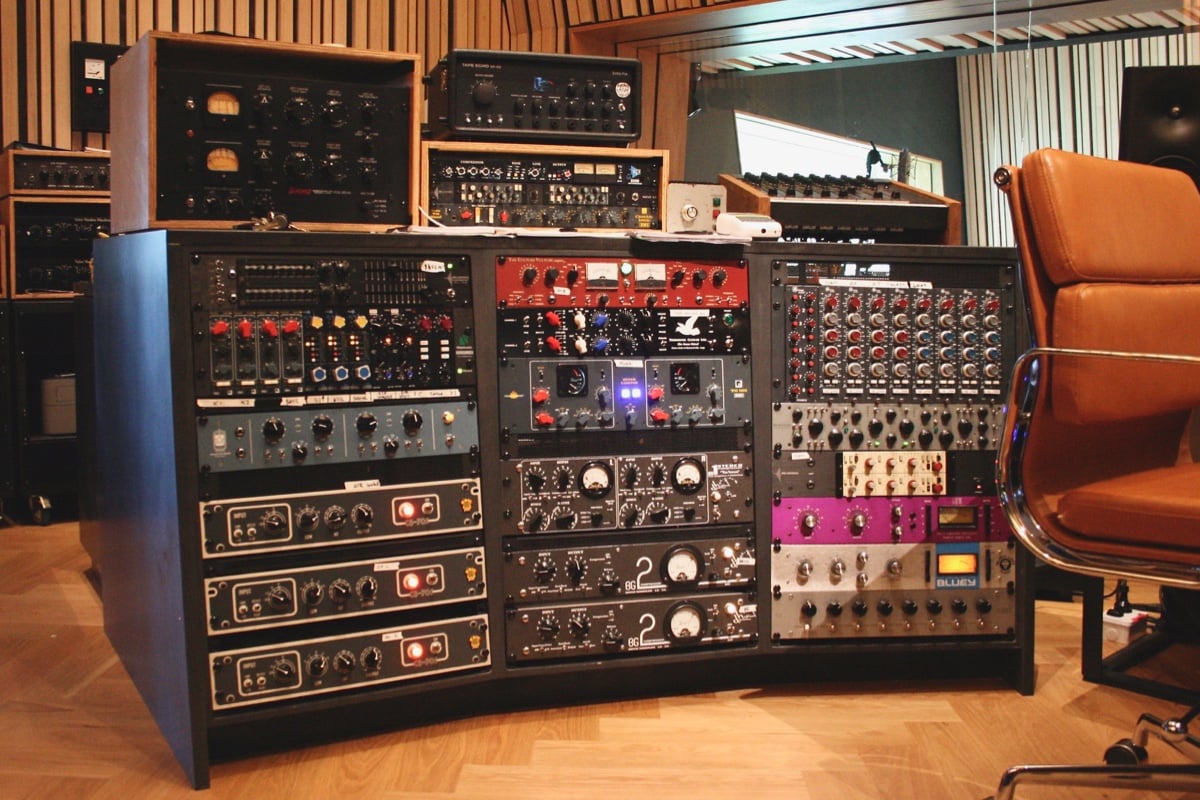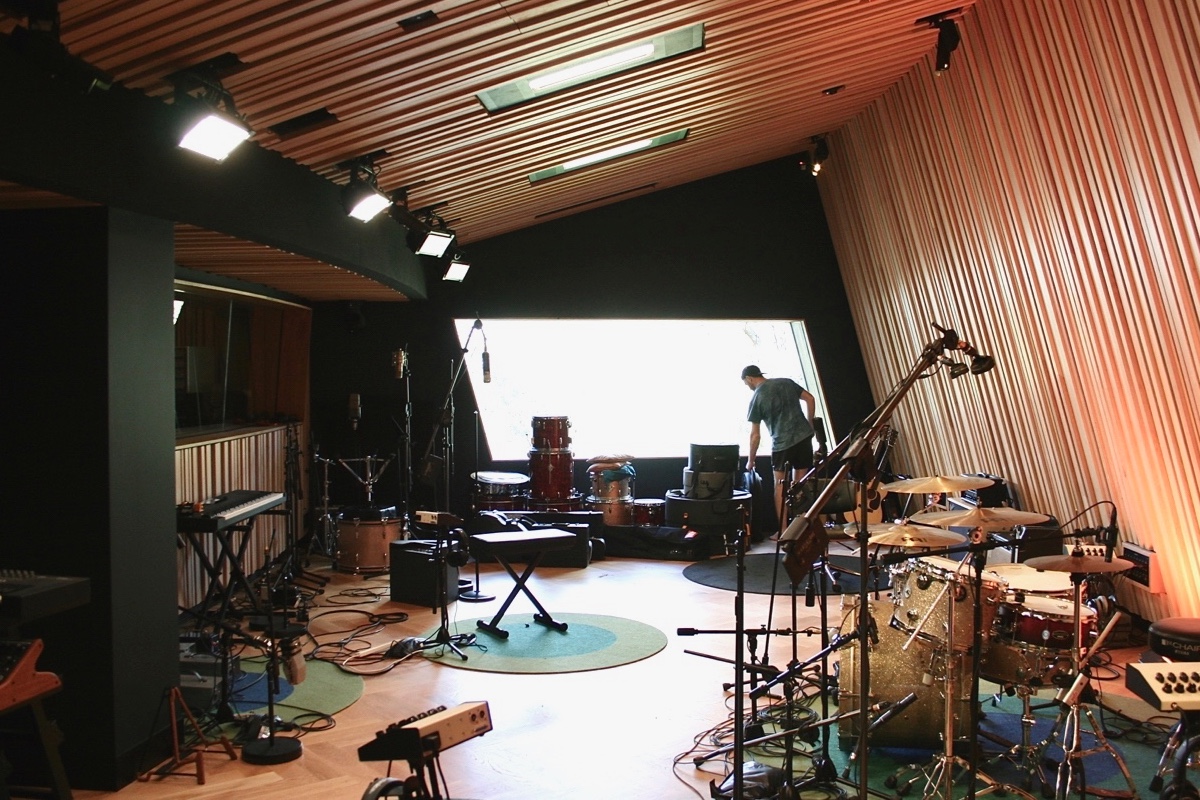With a fiercely punk DIY ethos attached to most of their music endeavours so far, Tasmanian band Threats has been cooking up their second studio album in the state’s newest recording studio, Frying Pan Studios at Hobart’s Mona.
For guitarist Dale Evans and vocalist Bek Binnie, the experience has been mind-blowing. “We’ve only ever done recordings in dank rehearsal studios with our mates in the past,” the former explains. “Then going into [Frying Pan Studios] and looking at a microphone that’s worth more than everyone’s entire set ups combined is pretty unreal.”

Frying Pan Studios Credit: Bek Binnie
It’s not just the studio itself that makes the experience special, according to Binnie.
“It’s pretty unreal just to be in the Mona setting,” she says. “Driving up into Mona every morning and getting to walk around the grounds with (Mona founder) David Walsh tagging behind and that sort of stuff, it was all pretty luxe.”
Evans and Binnie, along with bassist Kane Parsell and drummer Matt Cocks, were the first band to experience the architect-designed studio space – which houses an ex-Abbey Road REDD.17 recording console used by The Beatles, Pink Floyd and The White Stripes – under the guidance of head producer and engineer Chris Townend, who has worked with acts like Portishead, D12, Silverchair and Augie March.
Love Music?
Get your daily dose of everything happening in Australian/New Zealand music and globally.
“We actually got approached by Chris, who is running the studio,” Evans says. “I believe that came about because he had asked Ben Salter, who basically lives at Mona, who where the Tasmanian bands he should look at, and I think Ben pretty much just said ‘Threats’ and that’s it from what we’ve heard, which is absolutely lovely of Ben.”
The band is an amalgamation of the previous bands the four have played in: Evans and Binnie were in a band together for several years, which Cocks had also been a part of in their last incarnation, while Evans and Parsell had also previously played in a number of bands together.
“It’s kind of an amalgamation of all the best people to work with,” Evans insists. “All the crew that most musically gelled and found it easiest to work with each other, which I guess translates to why we get to do so much cool stuff.”
Given the bandmates’ lifestyles outside the band, Binnies believes working with good people made the most sense.
“I think as we’re getting older we have a little less time, a couple of us are parents, and when you have one day a week you can put aside for band practice you want that to be with good people,” she says. “I think that’s a reason we’ve ended up doing so well, because we’ve just gone in it for fun and I think that shows in our music.”
Threats self-released their debut album, I’ve Been Disappointing Lately, in 2021, followed by a split 7-inch release with fellow nipaluna/Hobart band, Smug Anime Face, last year. A lot of the first record was Threats finding its feet as a band, Evans says.
“A bunch of that is, I guess, the logical continuation of the last band and just kind of continuing to do the same thing,” he says. “And now – we’ve talked about it a bit – no one has actually written a Threats song in a couple of years now; so instead of someone coming in and being like, ‘Here’s a finished song,’ now someone comes in and is like, ‘Here’s one riff,’ and then as a band we spend four months pulling it apart and writing a song around that one riff until that riff’s not even in the song anymore.”
The new record – working title Damage/Control – brings all four band members’ input together into a more cohesive sound… which is still chaotic, according to Binnie.
“Chaotic is a good term; but also it’s not that sort of chaotic hardcore punk that’s hard to listen to and it changes all the time,” she claims. “It’s chaotic, but we sit into the riffs, and we let a groove happen for a while amongst all the chaos.”
A distinct lack of accessible recording studios in the nipaluna region has left many bands relying on locals with a passion and some technological nous. I’ve Been Disappointing Lately was recorded with a friend of the band who was just starting to get into sound engineering.
“He had just bought a bunch of gear and had never done a record before – we were his guinea pigs,” Evans remembers. “And it was done in our old practice space, which was called The Rat Palace, which was a dank bedroom in a building with the oldest flushing toilet in Australia.” The process also included a 12-month wait for the mixes, he adds.
“The people who know how to do that stuff aren’t doing it for a living; they’re doing it in their spare time and they’re also doing the same thing for six other bands,” Evans continues. “So by the time they’ve done a full-time job and mixed the five albums that are before you, that’s what wait times are – and that’s not a complaint, that’s how we’ve always done things.”

Frying Pan Studios Credit: Bek Binnie
Working with Townend in Frying Pan Studios has been the polar opposite experience, Evans laughs.
“I think there were more microphones on the drum kit than we used on the whole recording of the first album, and one of the mics was worth more than everything put together that was used on the first record,” he says. “Everyone I’ve ever done a record with has been exceptionally talented and done amazing things, but when you’re limited to what your expendable income can buy for yourself and what you can borrow off your bands in the space that you’re doing it in, there’s a level that you can get to and that’s it.”
Despite its state-of-the-art facilities and impressive collection of both vintage and modern recording equipment, Frying Pan Studios is designed to be affordable to up-and-coming acts.
“The studio is affordable to small artists, and they have this idea of trying to capture the essence of Hobart’s music scene, which is refreshing,” Binnie says. “They’re not wanting to fill it up with bookings of bands that are going to pay whatever to get in there.”
Evans adds that Townend said he could charge more, but then the studio would be empty.
“He set up a sliding scale that means that unsigned bands with no label support and no grant and only the money they’ve made from playing shows can still actually afford to get in there,” he says. “And then he’ll charge more for the people that can afford it, in order to offset doing things like letting us in there.”
Threats is one of many local bands that has played at Mona, which has helped them afford the cost of studio time.
“I’ve heard a few bands around say that the call playing on the Mona lawns a ‘fundraiser’ as in, ‘We’re doing a little fundraiser guys, we want to print some merch,’” Binnie laughs. “They pay well and it’s refreshing, because it means bands can function as a band – you can play a show on the Mona lawns and you get enough money from that to do a merch run, or press a record that you might have done DIY, and now you can use that money to go into the studio there.”
After supporting A Wilhelm Scream recently, the band is now working with Music Tasmania on some grant money with hopes of heading to BIGSOUND later this year.
“Between jobs, family and financial restraints, leaving Tassie is a lot more logistically different and financially different to being on the mainland,” Evans says. “So it’s slightly harder than it could be.”
For now, the band is looking forward to releasing something they’re “incredibly proud” of, and saying yes to more shows after taking almost six months off regular gigging to get ready to record.
“I think we might try and swing it around to a few labels that we’d like to be on and see what some ears think about it,” Binnie says. “We’re not looking for fame and glory, we just want to play some really fun shows.”
You can find out more about Frying Pan Studios here. You can follow Threats on Instagram.
View this post on Instagram



































